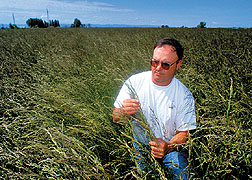This page has been archived and is being provided for reference purposes only. The page is no longer being updated, and therefore, links on the page may be invalid.
|
A Forage Laboratory for America's Mid-South
By Alfredo FloresNovember 19, 2004
A new, federally funded laboratory at the University of Kentucky (UK) is beginning to focus its research on meeting the needs of forage-based enterprises in the Mid-South. Established and managed by the Agricultural Research Service, the Forage-Animal Production Research Unit (FAPRU) in Lexington is now acquiring staff members and defining its research goals.
Ultimately, the projects at the new laboratory will aim to improve the productivity, competitiveness and sustainability of forage-based animal production by gaining insight into basic biological and environmental processes related to livestock grazing.
The FAPRU houses a dozen employees in its 5,000-square-foot space at UK's College of Agriculture. These include research scientists Glen Aiken, Randy Dinkins and Isabelle Kagan and laboratory support staffers Lori Smith and Tracy Hamilton. There are plans to hire three more lab technicians and two research scientists.
Under the direction of research leader James Strickland, the FAPRU recently held a two-day workshop attended by researchers, managers and stakeholders. They discussed current issues facing producers in the region. One of the more pressing issues involves tall fescue, one of the major cool-season grasses grown in Kentucky and across the United States.
Despite tall fescue's superior agronomic characteristics, it can cause a condition called toxicosis in cows, sheep and other ruminant animals that eat the grass. Fescue toxicosis symptoms include decreased growth rate, feed intake and milk production, as well as rough hair coat and poor reproductive performance. Consequently, ruminant livestock and horses don't usually perform as well on tall fescue as they do on other cool-season forages.
In addition to tall fescue, FAPRU scientists are studying clovers, Bermuda grass and other types of ruminant forages. They are also researching grazing system management.
Lexington is in the heart of Kentucky, one of the top calf-producing states east of the Mississippi. The horse breeding and racing industry--which holds its biggest event, the Kentucky Derby, near Lexington--also relies heavily on production of quality forage and is especially important to the region.
ARS is the U.S. Department of Agriculture's principal scientific research agency.

